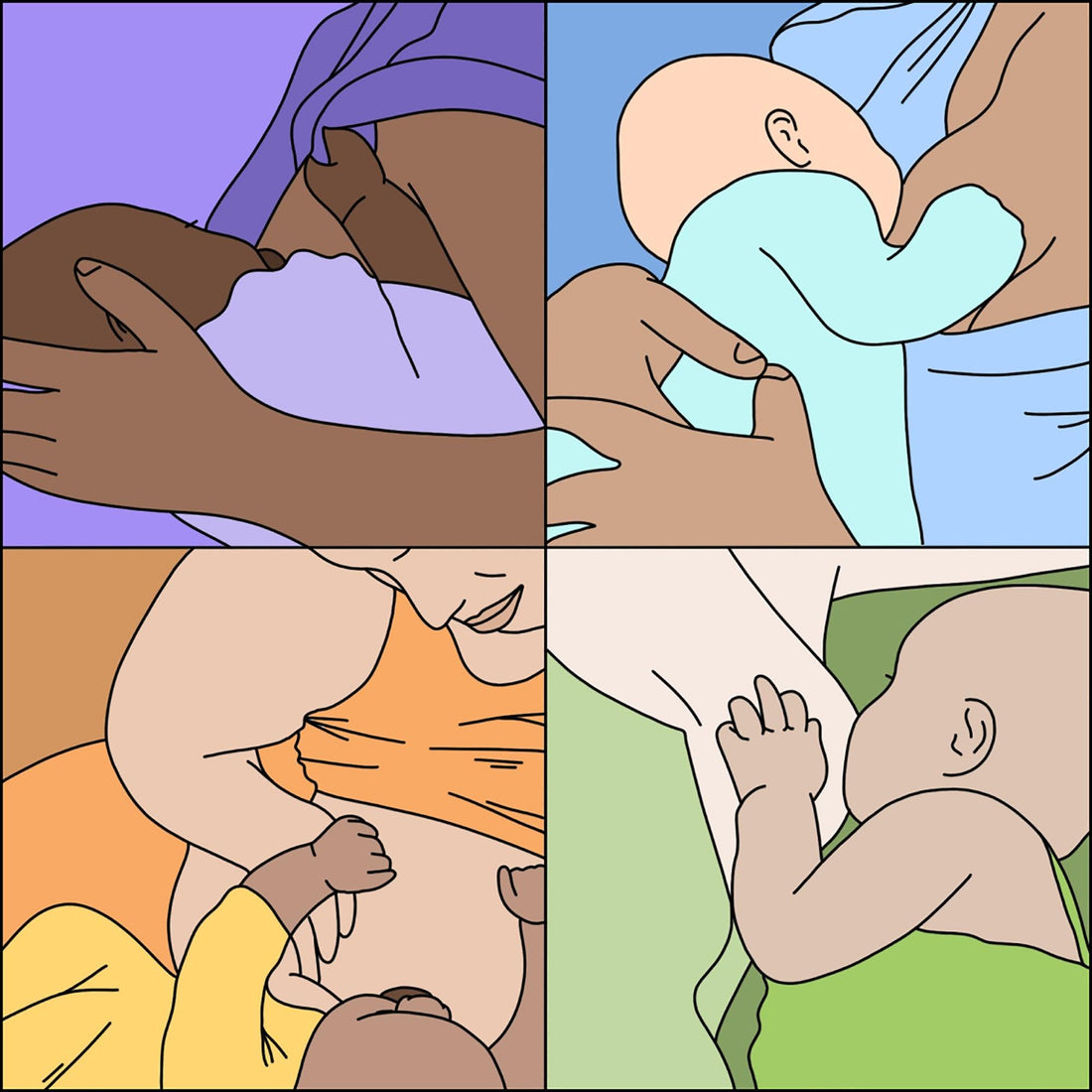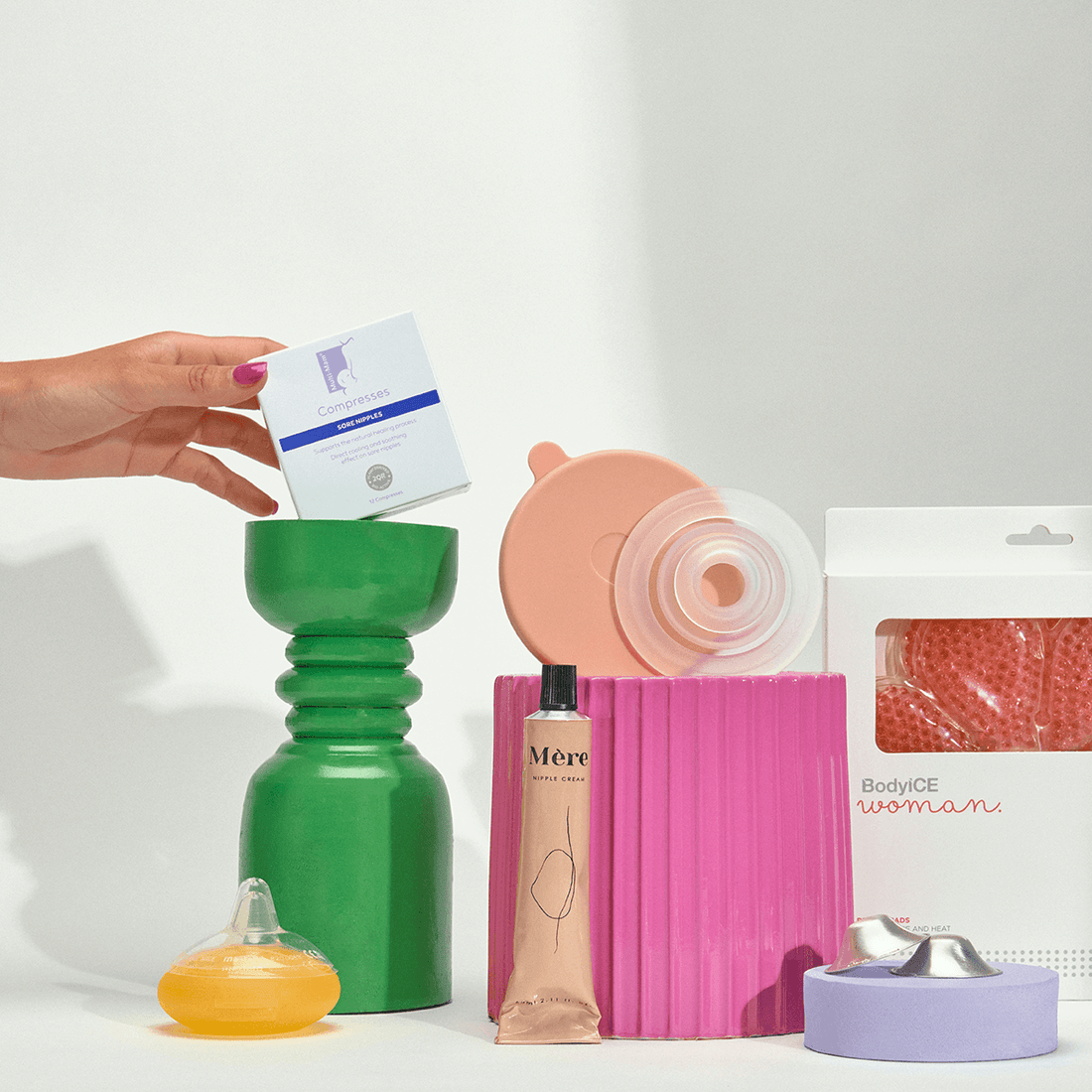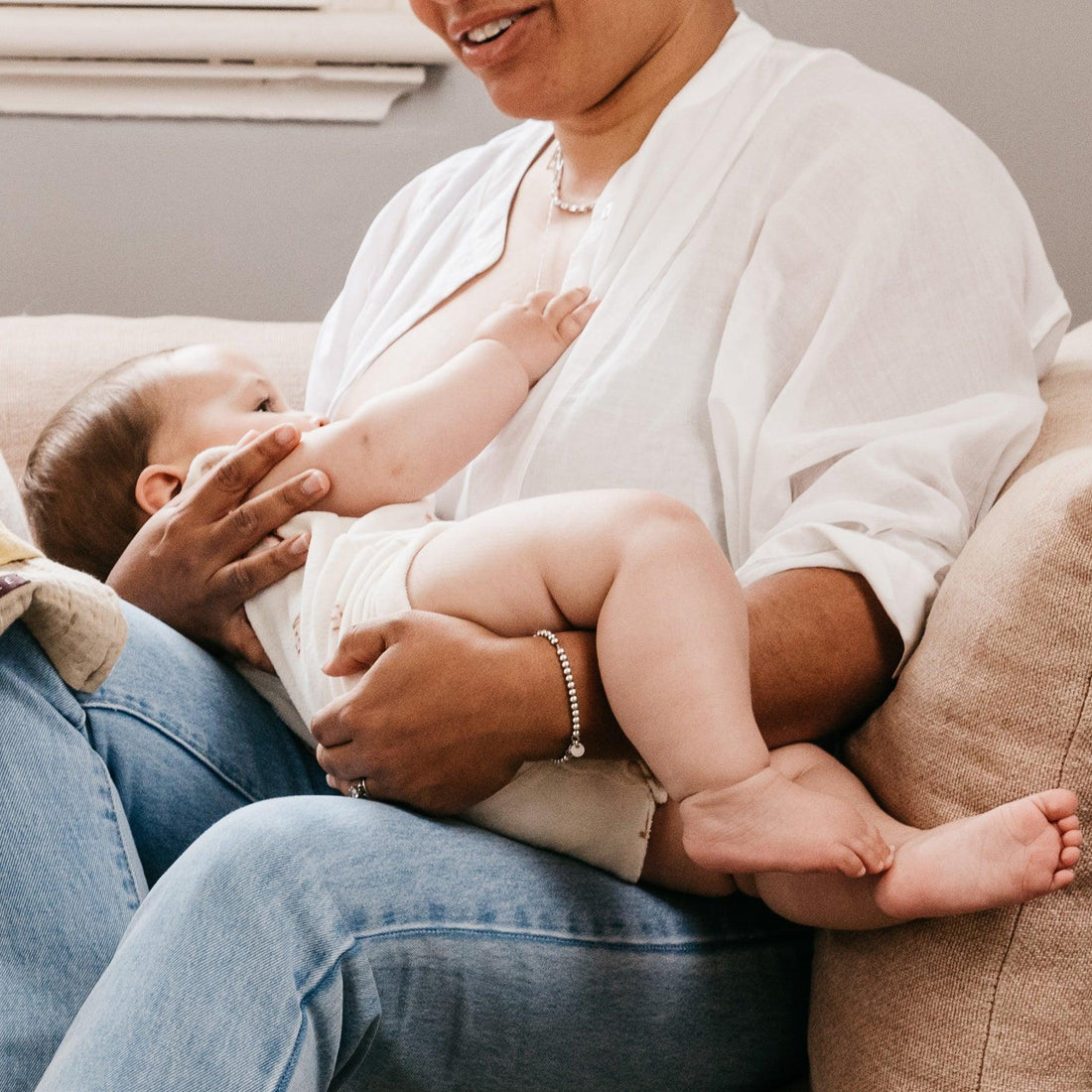It takes a lot of help to make breastfeeding work.
Breastfeeding is a loaded topic because, like everything in motherhood, each experience is so profoundly different. The way we parent and feed our kids is so individual, yet we’re overwhelmed with one linear message from society and the medical industry that “breast is best”. As new parents, we all want to do what is “best”, and it’s easy to see why so many of us feel like "failures” if or when we discover breastfeeding isn’t easy. The theme of World Breastfeeding Week 2022 is "Step Up For Breastfeeding, Educate and Support.", the sentiment being that everyone has a role to play in making breastfeeding work, and they need to take the initiative to do so. As someone who fed exclusively for 715 days, I can tell you I entirely agree with this statement, it truly does take a village. It takes the support of a great partner, a wider family, your employer, daycare, the broader healthcare system, and, it has to be said, an amount of privilege to be able to spend countless hours dedicated solely to your baby. The problem isn’t acknowledging this (although, greater awareness is required), it’s that, for the majority, many of these factors aren’t a reality for a breastfeeding person. Which means we're setting them up to fail.
Thinking about my own breastfeeding journey with my daughter, Sunday, there was a lot of joy, intimacy and love — I am someone who loved breastfeeding — but there were also a lot of sacrifices made by myself and my partner to continue it for so long. Sacrifices we had the privilege to make, but not everyone would be able to adopt. If society wants women to breastfeed, well and for years, here are the “everyone” who have their part to play...
Better Government Regulation Around Paid Maternity Leave
Forty percent of working mothers worldwide only get the basic maternity benefits from their workplace. Australia is on par. Our employers have autonomy in their own paid maternity leave policy, and according to 2020-21 WGEA data, just 3 in 5 employers (60%) offer access to paid parental leave. This is up from a government study in 2011 that found just 39 percent of workplaces offered paid parental leave. The government dictate that if you have been working in your current role for 12 months, you are eligible for 52 weeks of unpaid mat leave. So, whether you're casual, part-time or full-time, your company must keep a job for you whilst you are on leave. They also provide that if you have been working in your current role for at least 12 months, you are eligible for 18 weeks paid leave from the government, paying $772.60 per week, before tax. You must meet the work test, be the child’s primary caregiver and have individually earned less than $150,000 in the last financial year. You can get this on top of your internal work policy too if you meet the requirements, but almost half of new parent are only getting access to the 18 weeks, or a bit more than four months. It isn't nothing, but it's a far cry from the years required to be with your child to breastfeed them to meet the guidelines. Government regulation of minimum paid maternity leave policies is just the start of how big changes could be made. Better return to work support for companies and individuals could also shift the dial. Without employer financial support, many women need to return to work as soon as their government paid leave ends to make ends meet. Breastfeeding is a luxury, one many working women cannot afford. You want us to breastfeed more? Then pay us for it. Help us keep our jobs and transition back to them with adequate flexibility and support.
Workplaces Getting Competitive With Their Own Parental Leave Policies
In 2019 I was working at mid-sized advertising agency. After falling pregnant, I soon learnt that our mat leave policy was only a week of paid leave. This stoked a fire in my belly. I began collating an industry audit that included every major company’s maternity/parental leave entitlements and presented the case to my employers. The truth is no employer wants to seem redundant or unprogressive, some policies are just outdated and no one has had the balls to nudge them. Our work policy changed from one week to two months full paid leave. Alleviating family financial pressure really affords any birthing person to get into the headspace for postpartum. It paves a financially supportive environment for a positive breastfeeding journey too.
Paternity Leave Schemes That Are Encouraged to be Taken
When doing an industry audit of leave policies, it seemed apparent that the words “maternity leave” are redundant and “parental leave” is the way forward. Alexandra Whiting Editorial Director of The Memo writes, “There’s been a definite shift in the role of a dad in recent years. Parenting is, while not equal, a more shared role, as is paid and housework. More than anything, the details of who does what is unique to each family. Paternity leave is on more workplace policies, the parental role of men in the public eye is more seen, and there are more realistic portrayals of fatherhood in media, but the issue remains with the culture. It’s one thing for a male-dominated company to advertise their excellent paternity leave scheme, it’s another for the employees to feel comfortable taking it”. As of March this year, 99.5 per cent of Parental Leave Pay is taken by mothers. Linktree, a high-growth social media start up recently unveiled their new 18 weeks of paid leave for all new parents, regardless of gender or family constructs. This holistic approach to parental leave spans the time leading up to the leave, right through to after new parents return. Spotify also offer 6 months of full parental leave for primary and secondary carers whilst CHE Proximity have developed a 4/5 program where a returning parent is paid for 5 days but only works 4 for their first year back in the office. Neglecting to factor in an immediate support person is a massive letdown of a bigger system that fails the feeding person. If you’ve had major abdominal surgery, your partner's ability to pass you the baby to feed until you recover is essential in those establishing days. All carers of a child should receive support and infrastructure.
Better Education on Breastfeeding, Before the Fact
Monkey see, monkey do! I remember watching the few girlfriends breastfeeding with utter intent. As modern dwellers, we have less time to tap into ancestral learning. We are no longer raised in villages bearing witness to our aunties and cousins feeding their children and with this in mind, education should be easily accessible during pregnancy. It is common for a feeding person not to see a lactation consultant until once the baby arrives, but the benefits of seeing someone before could also make a difference. Education helps to empower an individual with tools, techniques, devices and mental and emotional coping mechanisms that can make you feel in control of a situation. Personalised education, like a pre-birth consultation with a lactation consultant who could tell you any challenges you might personally face (nipple shape, breast shape, etc.) and how to overcome them (nipple shields, positions, etc.) would do so much to prepare women who are (likely) to preoccupied thinking about labour to give headspace to feeding. Like the ambiguous “due date” we should wipe the timeline for establishing feeding. In the current education there is the idea that it needs to happen straight away, or it never will, and it has to be all or nothing. Just because you don’t do it straight away doen’t mean you never will. Care providers should point women in the direction of great lactation courses, nutritional support, and mental care before things spiral. Why do we only fill the well when its empty? Imagine if Silverettes, pumps and lactation consultants were claimable on Medicare? Money should not prohibit access to empowerment.
A Partner that Supports You
A recent article on the Inc quoted, “If you do the math, a year of breastfeeding equates to a conservative estimate of 1,800 hours of a mother's time. This isn't far off from a full time job considering that a 40-hour work week with three weeks of vacation comes in at 1,960 hours of work time a year.” . It's hugely time consuming, and means you are less available for other chores, care or work. Without leave or extra support, this puts pressure on partners who possibly have played a minority role in the household, to pick up the slack. For some partners, this is alot. If they struggle, it puts pressure on the relationship. Women are at an increased risk of experiencing violence from an intimate partner during pregnancy and postpartum. It's important that partners can also have access to support for the extra demands of a new baby. One in 10 dads struggle with depression following the birth of their baby. Simply put, as a new mum who is consumed with feeding, you simply can’t be at work and don’t have the capacity for all the household work. Defining roles in the house such as cooking, cleaning, loads of washing, housework, taking the baby for early walks are all ways can help set up for healthy dynamics in a partnership. When I started teaching yoga again, my husband would wait in reception, so I could feed my daughter in between classes. Similarly, when I went to my girlfriend's Hens party, he was strategically parked around the corner so I could feed her on the clock. These memories are forever ingrained because they are milestones or moments where I was reclaiming myself. But they came at huge effort, commitment and a big sacrifice for my husband, as well as for me.
Normalising Breastfeeding in Public
We have been brought up in patriarchal society where we have hidden our breasts since the very first sports bra we wore since puberty. In conjunction, breasts have been sexualised in mass media for too long. An innate shift happens to a woman's body when her breasts become a life support to nourish her child. Perhaps this shifting perspective doesn’t necessarily happen to the rest of society. Even in metro-city Melbourne, I could sense the uncomfortably of others around me. I fed my daughter on the tram, at Uniqlo in between aisles, one boob hanging out at the supermarket, or in the car pulled over on the side street. On one occasion, I was asked politely if the “parent's room would make me more comfortable?". It wasn't me who would have been made more comfortable. We have a whole lot of unlearning to do in this space. Women should feel empowered to feed wherever and whenever. Not behind doors or under the shield of muslin cloths.
The Gatekeeping Removed on Formula Information
There are strict regulations for marketing formula. Reading the guidelines, it feels it's set up this way because it's believed if infant formula is advertised, it will deter women from breastfeeding. In addition to feeling pretty, well, insulting, it can also make it harder to find information to help you choose what formula is right for you. “Information on formula feeding is intentionally restricted through the health care system to “protect” breastfeeding so there is no support or information until it’s virtually at a crisis point for the mother, or the baby has obvious signs of weight loss or allergies," says Miriam Weir, co-founder of Mumamoo. "We are actively advocating for access to information around formula feeding, so that anyone going into parenthood is across what their options are. There are only two ways to feed a baby, so being able to access equal information makes sense. The support tap shouldn’t turn off for any woman or parent, regardless of their feeding choices."
Removing the Stigma and Pressure Around Feeding
Doubt, pressure and anxiety take such a toll on a person's feeding journey. To make milk, prolactin and oxytocin work together. These hormones work best when you are feeling good and safe. Cortisol, the hormone released when your body is in a state of stress, can block these natural hormones (the same way it stalls labour). Anxiety and stress take such a toll on one's ability to feed. Feeling like you have to get it right, do what's "best", only acts to hinder your efforts. So society needs to lay-off. As Emily Oster says in her chapter on feeding in Cribsheet, "If you don't want to nurse, or if it doesn't work out, it's not a tragedy for your baby, or for you. It is almost certainly worse if you spend a year sitting around feeling bad about not nursing." When it comes to feeding, there is no right or wrong because breastfeeding is not black and white. It’s a kaleidoscope of colours and that's what makes it so hard to navigate but also, so very beautiful.
Photography by Ilsa Wynne-Hoelscher Kidd




















